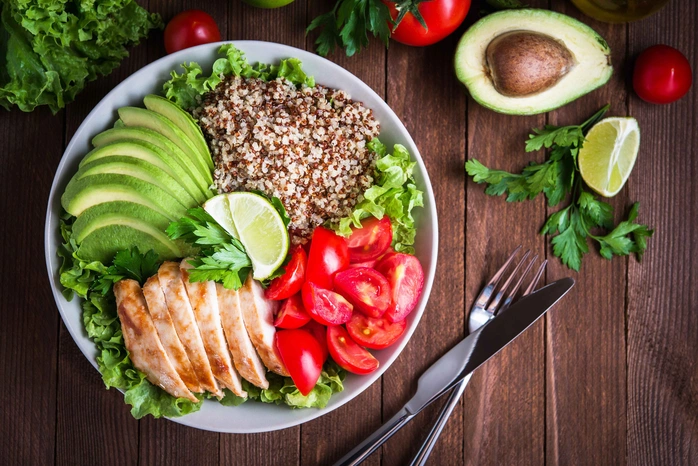For people with diabetes, a reasonable, balanced and timely diet is very important to help control blood sugar well, prevent complications and improve quality of life.
The Role of Nutrition in Diabetes
After eating, the body converts Carbs into glucose, which is absorbed through the digestive system. Glucose enters the bloodstream and causes blood sugar (blood sugar level) to increase. At this time, more insulin is secreted, acting as a key to open the doors of cells to help glucose go from the blood into the cells, creating energy for the body. When blood sugar decreases, less insulin is secreted.

Choosing a healthy diet, rich in green vegetables, ripe fruits… is good for people with diabetes.
However, chronic high blood sugar levels due to consuming large amounts of carbs can change the body’s ability to use insulin, leading to type 2 diabetes. Sugary foods such as desserts, soft drinks, candy, etc. can quickly increase blood sugar levels.
Or consuming foods rich in starch can also lead to a spike in blood sugar levels. If this high blood sugar level is maintained for a long time, it can lead to long-term complications, such as nerve, kidney, and heart damage, etc.
Therefore, it can be affirmed that when implementing a healthy diet, it will help patients control blood sugar levels, control weight, and control risk factors for heart disease (including high blood pressure, high blood fat).

Consuming processed foods, sweets… causes the risk of increasing blood sugar.
What is a healthy diet for people with diabetes?
A good diet for people with diabetes is a healthy diet that helps control blood sugar levels. This is a diet that is reasonably calculated in calories, carbs, protein, fat and fiber to suit the body’s nutritional status, distributed reasonably between main and side meals…
This diet includes the main ingredients of fruits, vegetables, lean meat, poultry, fish, eggs, dried beans, peas, non-fat or low-fat dairy products and whole grains…
Risks of not following a healthy diet
Applying a healthy diet is the best way to control blood sugar levels and prevent complications of diabetes.
For overweight and obese people who need to lose weight, the diet can be adjusted according to specific goals. When you do not follow a healthy, balanced diet, your body will not receive health benefits but will also worsen existing medical conditions.
Here are some unhealthy foods:
– Refined carbohydrates: Many foods contain refined flour, which has had the bran and germ removed during processing. As a result, the finished product does not have as much fiber as whole grains.
The body processes these starches quickly, leading to a spike in glucose levels, which increases the risk of type 2 diabetes.
– Foods high in saturated fat: Saturated fat is an unhealthy type of fat that has been linked to insulin resistance. Additionally, consuming any food that can lead to weight gain can put you at risk for diabetes. Foods high in saturated fat include fatty cuts of red meat, chicken or poultry with the skin on, coconut oil, palm oil, and whole-grain dairy products like butter, cheese, and milk.
– Foods with added sugar: Any food with added sugar, especially fructose (fruit sugar), causes a rapid spike in glucose levels. Added sugars include obvious sweets like candy, cakes, cookies, yogurt ice cream, sauces, and salad dressings.
– Sugary drinks: Sugary drinks are full of empty calories with no nutritional value and are a quick way to spike blood sugar. Research shows that consuming one sugary drink a day can increase your risk of type 2 diabetes by 25%.
– Fried foods: Foods fried in oil can lead to weight gain, high cholesterol, and high blood pressure – three risk factors for diabetes. A Harvard Health study found that eating fried foods four to six times a week increased the risk of type 2 diabetes by 39%. That number increased to 55% for people who ate fried foods every day.
– Processed foods: Processed foods are loaded with oils, sugar, salt, and preservatives to enhance the product’s flavor and shelf life. A large 2019 study found that people who consumed diets containing 22% processed foods (1 in 5 meals containing processed foods) had a higher risk of developing type 2 diabetes.





